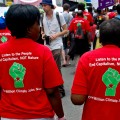It’s All About the Money: LCA Updates
Sophie Trevitt | November 30, 2012.

As negotiations in Doha continue three things are glaringly obvious – the process is slow, there remains a distinct lack of trust between developing and developed countries and it’s all about the money.
Yesterday, day four of the negotiations, Australia again stood with several other developed countries in what is being perceived as a deliberate attempt to stall progress.
In the Ad Hoc Working Group on Long-term Cooperative Action (LCA) informal consultations, the tensions that were emerging on day two continued to bubble. Historically, the LCA has been one of the more tumultuous negotiating streams of the UNFCCC. Tumultuous would be an appropriate word to describe the discontent and confusion that characterised today’s negotiations as Japan and the United States launched a strong challenge to the Chair’s attempts to guide the text.
The animosity generated appears to be multifaceted. Japan, the US and a number of other developed countries resent the Chair’s influence over the proceedings. They consider it a breach of process; and it runs contrary to their belief that negotiations under the LCA are complete and it is time to move onto an implementation stream under the Durban Platform. Read why developing countries disagree here.
Further, it appears that there is substantial confusion over what text is being used in the negotiations. Different contact groups seem to be using different texts which is generating further frustration. The result of this confusion was that the 90 minute consultation was spent discussing procedural disagreements rather than working towards substantive progress. There is speculation over whether the inability for developing and developed countries to agree on when the LCA should end and the Durban Platform begin will derail the entire process.
The lack of certainty around finance is the other key issues plaguing negotiations. Whilst $100 billion has been committed to long term mitigation and adaption for developing countries, so far this Green Climate Fund (GCF) remains empty and there is no clear indication of when the coffers will be filled.
Observers of the negotiations have dubbed this issue the “climate fiscal cliff”. GCF board members from the UK, Germany and the USA have reassured developing countries that the financing will continue. Despite the termination of the Fast Start climate funding this year, they have failed to specify how much and when money will be put on the table. Developed countries, including Australia, maintain that climate financing has been budgeted for; it just can’t be delivered until the recipient countries are “climate funding ready,” which includes having a fully operational GCF.
Additionally, substantial criticism has been levied at developed countries for not contributing “new” and “additional” finance under the Fast Start scheme, as promised. According to Oxfam’s calculations only 30-33 percent of finance was actually new and additional as opposed to already budgeted and/or allocated for other purposes. Only forty percent of the money has been delivered as grants (as opposed to loans). This lack of transparency has further tarnished the already shaky trust of developing countries who are now seeking reassurance that they are not going to be left with empty bank balances in 2013.
There are also technical disagreements over where the money should come from and how it should be allocated. The G77 and China maintain that climate finance should come from new public funds mobilised by developed countries in an attempt to ensure predictability and transparency. However, developed countries such as the UK, believe that private funding sources are critical to the process of also shifting the private sector towards a low carbon future.
The shared fear of developing countries is that climate finance flows will decrease in 2013 when the Fast Start scheme ends – precisely when they need it to amp up. There is a loud demand for the initial capitalisation of the GCF to take place here in Doha.
It’s only day four, and there is still time for the Presidency of Qatar to step in and shift the tone of the negotiations, or for developed countries to make a gesture of good faith to facilitate moving forward. However, it is disappointing that the LCA is already bogged down in debates over technicalities because developed countries are reluctant to discuss equity. Before the Ministers arrive next week in Doha, it is critical that the current inertia is broken in order for progress to be made.
By Sophie Trevitt, photo by Linh Do.











comment